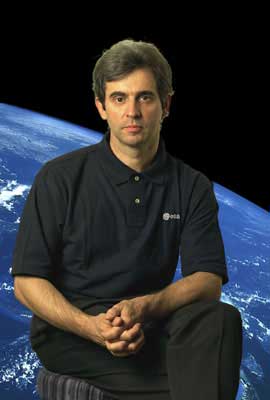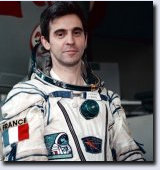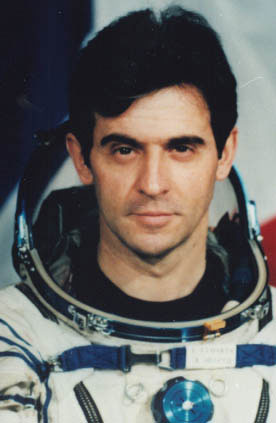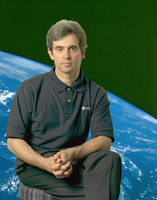RSC
Energia bio
(Nov 07) |
 Leopold
EYHARTS Leopold
EYHARTS
ISS Flight Engineer-2,
ESA Astronaut, France
BIRTH DATA AND PLACE:
April 28, 1957, in Biarritz, France.
EDUCATION:
Graduated as an engineer from the French Air Force Academy of Salon-de-Provence
in 1979. Gualified as a fighter pilot in Tours in 1980 and graduated from
the French test pilot school EPNER in Istres in 1988.
FAMILY STATUS: Married and has one child.
AWARDS AND HONOURS:
Officer of the French Legion d’Honneur and Chevalier de I’Ordre National
du Merite and Medaille d’Outre-Mer, the Silver Medal of the Defense Nationale
and the Russian medals for Friendship and Courage.
HOBBIES:
Jogging, mountain biking, tennis, reading and computers.
WORK EXPERIENCE:
In 1980 he became a fighter pilot and was assigned to an operational
Jaguar A squadron in Istres Air Force Base (France).
In 1985, he was assigned as a flight commander at Saint-Dizier Air
Force base.
In 1988 he graduated as a test pilot in the French test pilot school
(EPNER) and was assigned to the Bretigny-sur-Orge Flight Test Center near
Paris and in 1990 he became Chief Test Pilot.
Eyharts has logged 3800 hours flying time on over 50 types of aircraft
and made 21 parachute jumps including one ejection.
In 1990, Leopold Eyharts was selected as an astronaut by the French
National Space Agency (CNES) and assigned to support the Hermes space plane
program managed by the Hermes Crew Office in Toulouse. He also became one
of the test pilots and engineer in charge of the CNES parabolic flight
program (with Caravelle aircraft) and also carried out Airbus A300 Zero-G
qualification flights.
Leopold Eyharts underwent two short-duration training sessions at the
Yu.A. Gagarin Cosmonaut Training Center near Moscow in 1991 and 1993.
In 1992, he participated in the European Space Agency (ESA) astronaut
selection.
In July 1994, he was assigned as a back-up crewmember of the French-Russian
Cassiopee spaceflight which took place in August 1996.
In December 1996, he was selected as astronaut for the CNES scientific
space mission under the Pegase program.
He performed his first space flight from January 29 to February 19,
1998 onboard the Russian spacecraft Soyuz TM-27 and the Mir Station, together
with such Russian cosmonauts as A. Soloviev, P. Vinogradov, T. Misabaev
and N. Budarin. During the mission he performed experiments in the area
of medical research, biology, fluid physics and technology. He returned
to the Earth onboard the Soyuz TM-26 spacecraft. The flight duration was
20 days 16 hrs 36 min.
In August 1998, Leopold Eyharts joined the ESA’s European Astronaut
Corps whose homebase is the European Astronaut Center (EAC) located in
Cologne, Germany. He was assigned to train at NASA’s Johnson Space Center
in Houston, Texas and entered the 1998 Mission Specialist Class.
Leopold Eyharts received technical assignments within NASA Astronaut
Office at the Johnson Space Center, Houston. He is currently working in
the ISS Operations Branch as a section chief for ISS systems, software
and onboard information technology. Leopold Eyharts was assigned as backup
of Thomas Reiter for ESA’s first long-duration mission to the International
Space Station which took place between July 4 and December 22, 2006. From
October 2004 Eyharts trained together with his American and Russian colleagues
at Yu.A. Gagarin Cosmonaut Training Center near Moscow and at NASA’s Johnson
Space Center, Houston.
In 2007 Leopold Eyharts was assigned to a two-month ISS mission to
deliver the European Columbus laboratory to the International Space Station
(the Atlantis Space Shuttle, the STS-122 flight).
November 2007
Based on data of the ESA Space Center. |
|





 Leopold
EYHARTS
Leopold
EYHARTS